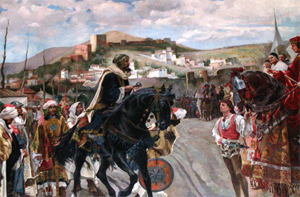
The Conquest of Granada

The Emirate of Granada was the only flaw in Isabella and Ferdinand's perfect marriage. Isabella was the heiress of the kingdom of Castile, and Fernando was to inherit the kingdom of Aragon. Essentially, once their time came, they would rule over most of the Iberian Peninsula. The wedding took place in 1469. Five years later, Isabella ascended to the throne. Ferdinand did so in 1479. They became the first monarchs of what now is Spain, and would be later known as Ferdinand and Isabella, the Catholic Monarchs.
But then there was the problem of Granada. It was the only area that had resisted the Reconquista -the campaign that kicked the Arabs out of Spain in the 1200's and which had come to a halt after the fall of Jerez de la Frontera in 1264- and thus, the only Arab Emirate in the otherwise unified country. Its inhabitants wouldn't conform to the kingdom's rules.
They wouldn't learn Spanish in Granada or whatever version of Spanish was spoken at the time, and the fact that it was was a Muslim emirate in a catholic kingdom troubled them greatly. One of their plans would be the Conquest of Granada; for the catholic monarchs inaction was impossible.
The Conquest of Granada
Their key to Granada's door was a young man called Boabdil. He was the son of the sultan Abu l-Hasan Ali, and as it sometimes happens with princes, Boabdil was restless to gain power. So, after a series of incidents between Christians and Muslims that shook Granada's stability, Boabdil named himself ruler of Granada. His declaration proved short-lived however. A civil war ensued in the emirate, weakening it and easing the way for the Christian troops.
Ferdinand and Isabella seized this opportunity and, while their troops were visiting Granada (more specifically, during the battle of Axarquia), abducted Boabdil and held him prisoner. . It is still unknown exactly how, but Boabdil was converted to Christianity, and became an ally of his former enemies. But even then he yearned for power and the throne of Granada. For the Christians there was no point discouraging him from capturing the throne – Boabdil’s powerful desire to take his father’s throne was a powerful weapon in the fight for Granada.
Boabdil went back to Granada, decided to fight his father and his uncle for this throne. He was subsequently kicked out of it and returned to Ferdinand and Isabella for protection. Meanwhile, the power balance in Granada kept getting more and more complex. Different leaders kept popping up, the Muslims kept fighting each other and soon, cities such as Ronda, started to fall. Marbella became Spanish as well.
Granada seemed almost under Iberian rule. The conquest of Granada was about to become real.
The Final Confrontation

The end of Granada's turn as an Emirate was, however, extended by Boabdil's nonconformity. He had been promised and given beautiful and extensive lands in exchange for his treason, but he didn't like that they were in Castile and not in Aragon, for some reason. So he decided to do what he did best: rebel against whatever land he was in. He headed back for Granada, where he found that the ruler that had kicked him out had in turn been killed by the Catholic Monarchs. So he ignited the flame of war again. He was perhaps inspiringly driven by patriotism and idealism. But in reality, he was flogging a dead horse: by then Granada had been reduced to a city and a mountain. Everything else was Spanish.
Boabdil desperately sought aid from every Muslim country at hand -- Egypt, Fez (now Morocco)... It didn't make any difference. Egypt was waging a war of their own against the Ottoman Turks, which made them friends with Spain; and Fez pretended they never got the message. Boabdil was in the battle... he was fighting against his enemies with the help of his former enemies.
This is symbolically true. But it was also true on a physical level. Since Granada no longer had a coastline, it could receive neither aid nor ammunition. Since Muslims and Christians alike were dying (no official records were kept at the time, but since the military was the main industry at the time, we can guess the body count kept adding up), the Catholic Monarchs decided to stop the fighting and just siege Granada in April 1491. They city fell into a painful decay for eight months and, on January 1492, surrendered to Spanish troops. Spain had won what today is known as the Conquest of Granada.
To this day, January 2 is a day of celebration in the city. Young foreigners staying at Spanish summer camps in Granada (they seem to be really popular in the area) are told this story, with more or less detail, and it is part of the city's heritage.
